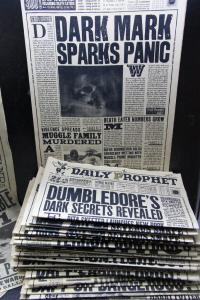Don't Fall for Fake News. Your library offers workshops and resources to build media literacy.

Before fake news and alternative facts there was … The Quibbler and The Daily Prophet. Yes, I am talking about the wizarding world of journalism. Bear with me.
For those who skipped the Harry Potter series, The Quibbler was Rowling’s storyline about a tabloid complete with sensational headlines, paparazzi and misleading (even fake) stories. The Daily Prophet, on the other hand, shared government-sponsored news, replete with alternative facts and spin control from The Ministry of Magic.
Imagine if Harry Potter readers graduated to Book 7 having gained media literacy skills from the stories. Sadly, the books’ negative depiction of media is troubling – both because it’s based in some truth and because it’s incomplete, leaving readers with a near total distrust of journalism. Sound familiar?
Lest we blame J.K. Rowling for the rise of fake news, it’s time to brush up on our media smarts. Oakland librarians can get you started.
EVALUATING NEWS - Resources
There are hundreds of lesson plans, websites and books on this topic. Some focus on how media shapes our views of gender or race, opens a new window. Others help you analyze website credibility with the CRAAP test, opens a new window, or check the political bias on your Facebook feed, opens a new window. Whatever you are looking for, Oakland librarians can help. Just ask!
Here are a few tools we recommend:
- How to Choose News - A brief video on truth and bias in news from TedEd
- AllSides - See news from multiple perspectives, left, center and right
- Snopes - Fact check rumors, news and politician statements
- How to Identify Fake News - A great visual guide from Indiana University
- How to Detect Bias in News Media - Fairness and Accuracy in Reporting helps you recognize bias, stereotypes and omissions
- Society for Professional Journalists Ethics Code, opens a new window - Learn the standards journalists are supposed to uphold
- Project Look Sharp - Lesson plans and materials to support critical thinking in the classroom
- Evaluating Information: The Cornerstone of Civic Online Literacy - A study from Stanford that can help us understand the problem of news evaluation along with some solutions
- National Association for Media Literacy, opens a new window - Develop skills to be a critical thinker, effective communicator and active citizen
- American Press Institute Resources, opens a new window - Activities parents can adapt too, from the American Press Institute
Teachers, librarians and parents, might also like Truth, Truthiness, Triangulation, opens a new window by Joyce Valenza, which compiles dozens more resources in School Library Journal.
No matter who makes the news, it also matters who owns the news. Find out which companies own what, opens a new window.
And don’t forget to READ FREELY and critically: Oakland Library offers free access to the New York Times digital edition, opens a new window and many more magazine and newspaper databases, opens a new window. As well as lots of great books:
Don't Fall for Fake News. READ FREELY and critically.
Photo courtesy of Karen_Roe on Flickr, opens a new window, Creative Commons.


Add a comment to: Truth, Lies and Quibblers: Media Literacy for a New Era